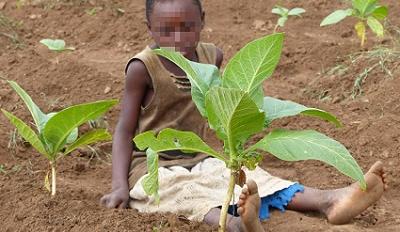
A letter delivered to the Government of Malawi today calls on leaders to address child labor and modern-day slavery in Malawi’s tobacco industry. The letter calls on land reform and support for efforts to diversify crops to help lift Malawi’s 300,000 tenant farmer families out of poverty. The Tobacco and Allied Workers Union of Malawi (TOAWUM) sent the letter, with a coalition of labor, human rights, and health groups. The full letter can be downloaded below.
“We are calling on our government to end all delays and ensure that farmers who have worked land for generations are able to earn a decent living for themselves and their families,” said Raphael Sandramu, TOAWUM general secretary. “Tobacco companies are taking advantage of the government and farmers alike to ensure access to cheap tobacco leaves from Malawi. It is time for us to work together to seek a more prosperous path.”
Malawi’s economy is dominated by foreign-owned tobacco leaf buyers and cigarette makers. Tobacco accounted for 52% of Malawi’s export earnings in 2010, making the country number one in the world for economic reliance on tobacco growing. This tobacco is largely grown by tenant farmers, recruited in the southern of the country to come to large tobacco plantations in the central and northern regions. Tenant farmers agree to grow a specified quantity and type of tobacco for their landowner, and in return receive the inputs for growing the tobacco and sometimes a small food stipend. But they are only paid once – when the tobacco is sold – and in the meantime must take loans from their landowner for food and other necessities. Tenant farmers are rarely told how much they have taken in loans or how much their tobacco was actually worth until after the crop is sold and their landlord gives them a final sum, minus their debt. Tobacco tenants and workers often end up getting caught in debt cycles to their landowners that they cannot escape.
“Tobacco growing has detrimental effects on poverty and development,” said Marty Otañez. “Tobacco farming erodes the lives of present and future generations of farmers. It degrades both human and land capital, key assets for rural development that should be focused toward healthy crops and environmentally friendly agriculture. Tobacco company corporate social responsibility scheme that seem to be popular in Malawi do not address the poor leaf prices or poverty earnings received by family members who create profits for leaf companies and cigarette manufactures.”
The letter was released in advance of a convening of the 179 countries that are parties to World Health Organization’s Framework Convention on Tobacco Control (FCTC), a global treaty dedicated to decreasing supply of and demand for tobacco, October 13-18 in Moscow, Russia. Part of the FCTC promotes efforts to help farmers in tobacco dependent countries like Malawi transition into alternate crops. Malawi has not yet ratified the FCTC, though the letter calls on it to do so as a way to, “address the social and environmental costs of tobacco.”
“Malawian tenant farmers realize that they cannot remain dependent on tobacco production,” said Brian Campbell, International Labor Rights Forum. “But they are caught between powerful industry and government forces. To break this system of abuse, the Malawian government must undertake reforms to empower tenant farmers and to hold tobacco companies accountable for their exploitative contracts and purchasing policies.”
###
Contact: Marty Otañez, Assistant Professor, Anthropology Department, University of Colorado – Denver, marty.otanez [at] ucdenver.edu, 415 306 4754
Brian Campbell, International Labor Rights Forum, brian.campbell [at] ilrf.org, (202) 701-3021
International Labor Rights Forum (www.LaborRights.org) is a human rights organization that advocates for workers globally.